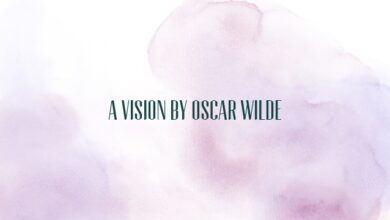
The Way the World Is by Zona Gale
The Way the World Is was first published in American Magazine, September, 1909. “When she was not with him he could think what to say to her. When he stood before her—the thought of his leave-taking on that veranda seized upon him, so that he caught his breath in the sharp thrust of mortified recollection,..”
THE New Lady’s house was marked by a row of poplars outside the fence, as if the very road changed its character when it passed her house. As for Nicholas, when he went by that house he became another being. This night—the first time that he had ever entered her gate—the protection of the twilight alone kept him from running away. Once under the poplars he did not know what way to look. To seem to look straight along the road was unnatural. To seem to look out across the opposite fields was hypocrisy. To look at her house was unthinkable. So, as he went in at the gate and up the aster-bordered walk, he examined the back of his hand—near, and then a little farther away. As he reached the steps he was absorbedly studying his thumb.
From a place of soft light, shed through a pink box shade on the table, and of scattered willow chairs and the big leaves of plants, she came toward him.
“You did come!” she said. “I thought you wouldn’t, really.”
With the utmost effort Nicholas detached one hand from his hat brim and gave it her. From head to foot he was conscious, not of the touch of her hand, little and soft, but of the bigness and coarseness of his own hand.
“I hated to come like everything,” he said.
At this of course she laughed, and she went back to her willow chair and motioned him to his. He got upon it, crimson and wretched.
“As much as that!” she observed.
“You know I wanted to come awfully, too,” he modified it, “but I dreaded it—like sixty, I—I can’t explain. …” he stumbled.
“Don’t,” said the New Lady lightly, and took pity on him and rang a little bell.
She thought again how fine and distinguished he was, as he had seemed to her on the day, soon after her coming to the village, when she had first spoken to him. She had driven out alone and at a fancy had crossed right away through the lush grass of a fenceless meadow, and she had almost run him down, lying on his face in the green under a cottonwood.
“Oh, what is the matter?” she had demanded in some alarm.
And: “Nothing. I just like it,” he had been surprised into saying.
“So do I, “she had told him heartily. “So do I. What,” she had asked, “do you like about it, best?”
“I guess—I guess I like it just on account of its being the way it is,” he had answered uncertainly.
“That is a very, very nice reason,” she had commented. “Again, so do I.” And she had left him, she remembered, looking about as if he saw it all for the first time.
Afterward, at a supper in the village church “lecture-room,” she had seen him again, bringing in a great freezer of ice-cream. She had greeted him and he had all but dropped the freezer. Then a certain big, obvious deacon, whose garden adjoined her own, had come and snatched the burden away, as importantly as if he had made himself at the very least; and the boy had stood, shamefaced, trying to say something. She had greeted him very gently, and though he had answered almost nothing, his face had lighted as at a summons. So she had divined his tragedy—the loneliness which his shyness masked as some constant plight of confusion.
“Come and see me sometimes,” she had impulsively bidden him. “Do you know where I live?”
Did he know that! Since that day in the meadow had he known anything else. And now, after a fortnight of hard trying, he was come. He sat staring at her, trying to realize that he was on her veranda, hearing the sound of the little bell she had rung. He had wanted something like this, wistfully, passionately. Miserable as he was, he rested in the moment as within arms. And the time seemed distilled in that little silver bell-sound and the intimacy of waiting with her for some one to come.
He knew that some one with a light foot-fall did come to the veranda. He heard the New Lady call her Elfa. But he saw only her hands, plump and capable and shaped like his own, moving among the glasses. After which his whole being became absorbed in creditably receiving the tall, cool tumbler on the tray which the capable hands held out to him. A period of suspended intelligence ensued, until he set the empty glass on the table. Then the little maid had gone, and the New Lady, sipping her own glass, was talking to him.
“You were lying on the grass that day,” she said, “as if you understood grass. Not many do understand about grass, and almost nobody understands the country. People say, ‘Come, let us go into the country,’ and when we get there is it the country they want at all? No, it is the country sports, the country home, everything but the real country. They play match games. They make expeditions, climb things in a stated time, put in a day at a stated place. I often think that they must go home leaving the country quite aghast that they could have come and gone and paid so little heed to it. Presently I am going to have some charming people out here at my house who will do the same thing.”
So she talked, asking him nothing, even her eyes leaving him free. It seemed to him, tense and alert and ill at ease as he listened, that he, too, was talking to her. From the pressing practicalities, the self-important deacon, the people who did not trouble to talk to him, his world abruptly escaped, and in that world he walked, an escaped thing, too.
Yet when she paused, he looked out at her shrinkingly from under his need to reply. He did not look at her face, but he looked at her hands, so little that each time he saw them they were a new surprise and, somehow, alien to him. He looked away from them to the friendliness of her smile. And when he heard himself saying detached, irrelevant things, he again fell to studying one of his own hands, big and coarse and brown. Oh, he thought, the difference between her and him was so hopelessly the difference in their hands!
In an absurdly short time the need to be gone was upon him; but of this he could not speak, and he sat half unconscious of what she was saying, because of his groping for the means to get away. Clearly, he must not interrupt her to say that he must go. Neither could he reply to what she said by announcing his intention. And yet when he answered what she said, straightway her exquisite voice went on with its speech to him. How, he wondered, does anybody ever get away from anywhere? If only something would happen, so that he could slip within it as within doors, and take his leave.
Something did happen. By way of the New Lady’s garden, and so to her side door, there arrived those whose garden adjoined her own—the big, obvious, self-important deacon, and behind him Three Light Gowns. The little maid Elfa came showing them through the house, in the pleasant custom of the village. And when the New Lady, with pretty, expected murmurings, rose to meet them, Nicholas got to his feet confronting the crisis of saying good-by, and the moment closed upon him like a vise. He heard his voice falter among the other voices, he saw himself under the necessity to take her hand and the deacon’s hand, and the hands, so to speak, of the Three Light Gowns; and this he did as in a kind of unpractised, bewildering minuet.
And then he found his eyes on a level with eyes that he had not seen before—blue eyes, gentle, watching, wide—and a fresh, friendly little face under soft hair. It was Elfa, taking away the empty glasses. And the boy, in his dire need to ease the instant, abruptly and inexplicably—held out his hand to her, too. She blushed, sent a frightened look to her mistress, and took the hand in hers that was plump and capable, with its strong, round wrist. And, the little maid being now in an embarrassment like his own, the two hands clung for a moment, as if they had each the need.
“Good night,” she said, trembling.
“Good night,” said the New Lady, very gently.
“Oh, good night!” burst from the boy as he fled away.
It was Elfa who admitted him at his next coming. The screened porch was once more in soft light from the square rose shade, and the place had the usual pleasant, haunted air of the settings of potentialities. As if potentiality were a gift of enchantment to human folk.
The New Lady was not at home, Elfa told him, in her motherly little heart pitying him. And at the news he sat down, quite simply, in the chair in which he had sat before. He must see her. It was unthinkable that she should be away.
On the willow table lay her needlework. It was soft and white beyond the texture of most clouds, and she had wrought on it a pattern like the lines on a river. As his eyes rested on it, Nicholas could fancy it lying against her white gown and upon it her incomparable hands. Someway, she seemed nearer to him when he was not with her than when, with her incomparable hands and her fluent speech, she was in his presence. When she was not with him he could think what to say to her. When he stood before her—the thought of his leave-taking on that veranda seized upon him, so that he caught his breath in the sharp thrust of mortified recollection, and looked away and up.
His eyes met those of Elfa, who was quietly sitting opposite.
“How they must all ‘a’ laughed at me. You too!” he said.
“Why?” she asked.
“That last time I was here. Shaking hands that way,” he explained.
“I didn’t laugh, ” she unexpectedly protested; “I cried.”
He looked at her. And this was as if he were seeing her for the first time.
“Cried?” he repeated.
“Nobody ever shakes hands with me,” Elfa told him.
He stared at her as she sat on the edge of her chair, her plump hands idle on her crisp apron.
“No,” he admitted, “no—I don’t suppose they do. I didn’t think——”
But he had not thought of her at all.
“By the door all day I let in hand-shakes,” she said, “an’ then I let ‘em out again. But I shouldn’t get any of ‘em for me.”
That, Nicholas saw, was true enough. Even he had been mortified because he had taken her hand.
“Once,” Elfa said, “I fed a woman by the backdoor. An’ when she went she took a-hold o’ my hand, thankful. An’ then you done it too—like it was a mistake. That’s all, since I worked out. I don’t know folks outside much, only some that don’t shake hands, ‘count o’ seemin’ ashamed to.”
“I know,” said Nicholas.
“Sometimes,” she went on, “folks come here an’ walk in to see her, an’ they don’t shake. Ain’t it funny—when folks can an’ don’t? When they come from the city next week, the whole house’ll shake hands, but me. Once I went to prayer-meetin’ an’ I hung around waitin’ to see if somebody wouldn’t. But they didn’t—any of ‘em. It was rainin’ outside an’ I guess they thought I come with somebody’s rubbers.”
Nicholas looked at her a little fearfully. It had seemed to him that, in a great world of light, he had always moved in a little hollow of darkness and detachment. Were there, then, other hollows like that? Places to which outstretched hands never penetrate? A great understanding and wistfulness possessed him and he burst out in an effort to express it.
“You’re a funny girl,” he said.
She flushed, and suddenly lifted one hand and looked at it. Nicholas watched her now intently. She studied the back of her hand, turned it, and sat absorbedly examining her little thumb. And Nicholas felt a sudden sense of understanding, of gladness that he understood. As he felt when he was afraid and wretched, so Elfa was feeling now.
He leaned toward her.
“Don’t feel afraid,” he said gently.
She shook her head.
“I don’t, ” she said; “I don’t, truly. I guess that’s why I stayed here now. She won’t be back till ten—I ought to ‘a’ said so before. You—you won’t want to wait so long.”
He rose at once. And now, being at his ease, his head was erect, his arms naturally fallen, his face as confident and as occupied by his spirit as when he lay alone in the meadows.
“Well, sir,” he said, “let’s shake hands again!”
She gave him her hand and, in their peculiarly winning upward look, her eyes—blue, wide, watchful, with that brooding mother watchfulness of some women, even in youth. And her hand met his in the clasp which is born of the simple, human longing of kind for kind.
“Good-by,” she answered his good-by, and they both laughed a little in a shyness which was in a way a delight.
In the days to follow there flowed in the boy’s veins a tide of novel sweetness. And now his thoughts eluded one another and made no chain, so that when he tried to remember what, on that first evening, the New Lady and he had talked about, there came only a kind of pleasure, but it had no name. Everything that he had to do pressed upon him, and when he could get time he was away to the meadow, looking down on the chimneys of that house, and swept by a current that was like a singing. And always, always it was as if some one were with him.
There came a night when he could no longer bear it, when his wish took him to itself and carried him with it. Those autumn dusks, warm yellow with their moon and still odorous of summer, were hard to endure alone. Since the evening with her, Nicholas had not seen the New Lady save when, not seeing him, she had driven past in her phaeton. At the sight of her, and once at the sight of Elfa from her home, a faintness had seized him, so that he had wondered at himself for some one else, and then with a poignancy that was new pain, new joy, new life, had rejoiced that he was himself. And so, when he could no longer bear it, he took his evening way toward the row of poplars, regretting the moonlight lest by it they should see him coming.
He had no intimation of her guests, for the New Lady’s windows were always brightly lighted, and until he was within the screened veranda the sound of voices did not reach him. Then from the rooms there came a babel of soft speech and laughter, and a touch of chords; and when he would incontinently have retreated, the New Lady crossed the hall and saw him.
She came to the doorway and greeted him, and Nicholas looked up in the choking discomfort of sudden fear. She was in a gown that was like her needlework, mysteriously fashioned and intricate with shining things which made her infinitely remote. The incomparable little hands were quite covered with jewels. It was as if he had come to see a spirit and had met a woman.
“How good of you to come again,” she said, “Come, I want my friends to meet you.
Her friends! That quick crossing of words within there, then, meant the presence of her friends from the city.
“I couldn’t! I came for a book—I’ll get it some other time. I’ve got to go now!” Nicholas said.
Then, “Bettina—Bettina!” some one called from within, and a man appeared in the hallway, smiled at sight of the New Lady, dropped his glass at sight of Nicholas, bowed, turned away—oh, how should he know that her name was Bettina when Nicholas had not known!
This time he did not say good night at all. This time he did not look at his great hand, which was trembling, but he got away, mumbling something, his retreat graciously covered by the New Lady’s light words. And, the sooner to be gone and out of the moonlight that would let them see him go, he struck blindly into the path that led to the little side gate of the garden. The mortification that chains spirit to flesh and tortures both held him and tortured him. For a flash he imagined himself up there among them all, his hands holding his hat, imagined having to shake hands with them—and somehow this way of fellowship, this meeting of hands outstretched for hands, seemed, with them, the supreme ordeal, the true symbol of his alien state from them and from the New Lady. No doubt she understood him, but for the first time Nicholas saw that this is not enough. For the first time he saw that she was as far away from him as were the others. How easy, Nicholas thought piteously, those people in her house all found it to act the way they wanted to! Their hands must be like her hands. …
He got through the garden and to the side gate. And now the old loneliness was twofold upon him because he had known what it is to reach from the dark toward the light; yet when he saw that at the gate some one was standing, he halted in his old impulse to be on guard, hunted by the fear that this would be somebody alien to him. Then he saw that it was no one from another star, but Elfa.
“Oh …” he said, and that, too, was what she said, but he did not hear. Not from another star she came, but from the deep of the world where Nicholas felt himself alone.
“I—was just going away,” he explained.
For assent she stepped a little back, saying nothing. But when Nicholas would have passed her it was as if the immemorial loneliness and the seeking of forgotten men innumerable stirred within him in the ache of his heart, in the mere desperate wish to go to somebody, to be with somebody, to have somebody by the hand.
He turned upon Elfa almost savagely.
“Shake hands!” he said.
Obediently she put out her hand, which of itself stayed, ever so briefly, within his. He held it, feeling himself crushing it, clinging to it, being possessed by it. Her hand was, like his, rough from its work and it was something alive, something human, something that answered. And instantly it was not Elfa alone who was there companioning him, but the dark was quick with presences, besieging him, letting him know that no one alive is alone, that he was somehow one of a comrade company, within, without, encompassing. And the boy was caught up by the sweet will outside his own will and he never knew how it was that he had Elfa in his arms.
“Come here. Come here. …” he said.
To Elfa, in her loneliness threaded by its own dream, the moment, exquisite and welcome as it was, was yet as natural as her own single being. But to the boy it was not yet the old miracle of one world built from another. It was only the answer to the groping of hands for hands, the mere human call to be companioned. And yet the need to reassure her came upon him like the mantle of an elder time.
“Don’t feel afraid,” he said.
Her eyes gave him their peculiarly winning upward look, and it was as if their mother watchfulness answered him gravely:
“I don’t. I don’t, truly.”
And at this she laughed a little, so that he joined her; and their laughter together was a new delight.
Across the adjoining lawn Nicholas could see in the moonlight the moving figure of the big deacon, a Light Gown or two attending. A sudden surprising sense of safety from them overswept the boy. What if they did come that way! What, he even thought, if those people in the house were to come by? Somehow, the little hollow of dark in which he had always walked in the midst of light was now as light as the rest of the world, and he was not afraid. And all this because Elfa did not stir in his arms, but was still, as if they were her harbor. And then Nicholas knew what they both meant.
“Elfa!” he cried, “do you …?”
“I guess I must …” she said, and knew no way to finish that.
“Love me?” said Nicholas, bold as a lion.
“I meant that too,” Elfa said.
Between the New Lady’s house and the big, obvious deacon’s lawn the boy stood, silent, his arms about the girl. So this was the way the world is, people bound, together, needing one another, wanting one another, stretching out their hands. …
“Why, it was you I wanted!” Nicholas said, wonderingly.





